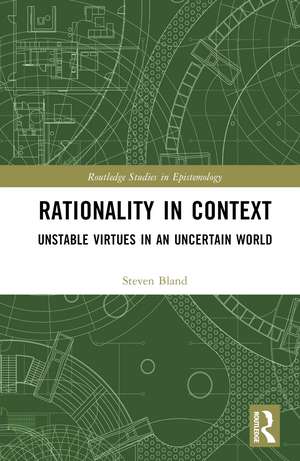Rationality in Context: Unstable Virtues in an Uncertain World: Routledge Studies in Epistemology
Autor Steven Blanden Limba Engleză Hardback – dec 2023
The explosion of empirical literature on human rationality has led to seismic shifts across a multitude of academic disciplines. This book considers its implications for epistemology. In particular, it critically evaluates the treatment of the rationality literature within the recent controversy between virtue epistemologists, who attempt to ground knowledge in stable epistemic virtues, and epistemic situationists, who claim that such a project is doomed by empirical evidence of widespread irrationality. It links this foundational controversy to two of the most important debates in psychology: the Rationality Wars and the person-situation debate. The book argues that both virtue theorists and epistemic situationists have misunderstood the implications of these debates, leading them to focus exclusively on personal dispositions and situational factors as two independent sources of epistemic success, failure, and improvement. A more accurate reading of the empirical literature implies that interactions between epistemic agents and their social, informational, and institutional environments are the fundamental drivers of both rational and irrational behaviour. An interactionist framework motivated by this insight conceives of epistemic virtues and vices as both responsive to and responsible for the environments in which they’re manifested and cultivated. The central aim of this book is to present and defend this novel type of virtue epistemology.
Rationality in Context will be of interest to scholars and advanced students working in epistemology, philosophy of science, philosophy of psychology, cognitive psychology, and social psychology.
Din seria Routledge Studies in Epistemology
-
 Preț: 312.12 lei
Preț: 312.12 lei -
 Preț: 311.56 lei
Preț: 311.56 lei -
 Preț: 325.83 lei
Preț: 325.83 lei -
 Preț: 381.77 lei
Preț: 381.77 lei - 18%
 Preț: 1003.61 lei
Preț: 1003.61 lei -
 Preț: 387.91 lei
Preț: 387.91 lei -
 Preț: 386.61 lei
Preț: 386.61 lei - 18%
 Preț: 1000.27 lei
Preț: 1000.27 lei - 9%
 Preț: 937.51 lei
Preț: 937.51 lei -
 Preț: 389.31 lei
Preț: 389.31 lei -
 Preț: 388.34 lei
Preț: 388.34 lei -
 Preț: 386.81 lei
Preț: 386.81 lei - 18%
 Preț: 1003.93 lei
Preț: 1003.93 lei - 18%
 Preț: 1002.99 lei
Preț: 1002.99 lei -
 Preț: 381.00 lei
Preț: 381.00 lei -
 Preț: 386.39 lei
Preț: 386.39 lei -
 Preț: 389.66 lei
Preț: 389.66 lei -
 Preț: 401.21 lei
Preț: 401.21 lei -
 Preț: 384.86 lei
Preț: 384.86 lei -
 Preț: 389.66 lei
Preț: 389.66 lei - 18%
 Preț: 1000.27 lei
Preț: 1000.27 lei -
 Preț: 389.70 lei
Preț: 389.70 lei -
 Preț: 382.95 lei
Preț: 382.95 lei -
 Preț: 393.90 lei
Preț: 393.90 lei - 18%
 Preț: 1002.50 lei
Preț: 1002.50 lei -
 Preț: 386.18 lei
Preț: 386.18 lei - 18%
 Preț: 1006.30 lei
Preț: 1006.30 lei - 17%
 Preț: 271.61 lei
Preț: 271.61 lei - 9%
 Preț: 935.90 lei
Preț: 935.90 lei - 18%
 Preț: 1004.24 lei
Preț: 1004.24 lei - 18%
 Preț: 999.51 lei
Preț: 999.51 lei
Preț: 1004.55 lei
Preț vechi: 1225.06 lei
-18% Nou
Puncte Express: 1507
Preț estimativ în valută:
192.22€ • 209.45$ • 161.97£
192.22€ • 209.45$ • 161.97£
Carte tipărită la comandă
Livrare economică 23 aprilie-07 mai
Preluare comenzi: 021 569.72.76
Specificații
ISBN-13: 9781032511207
ISBN-10: 1032511206
Pagini: 304
Ilustrații: 2 Tables, black and white; 2 Line drawings, black and white; 2 Illustrations, black and white
Dimensiuni: 152 x 229 x 19 mm
Greutate: 0.58 kg
Ediția:1
Editura: Taylor & Francis
Colecția Routledge
Seria Routledge Studies in Epistemology
Locul publicării:Oxford, United Kingdom
ISBN-10: 1032511206
Pagini: 304
Ilustrații: 2 Tables, black and white; 2 Line drawings, black and white; 2 Illustrations, black and white
Dimensiuni: 152 x 229 x 19 mm
Greutate: 0.58 kg
Ediția:1
Editura: Taylor & Francis
Colecția Routledge
Seria Routledge Studies in Epistemology
Locul publicării:Oxford, United Kingdom
Public țintă
Postgraduate and UndergraduateRecenzii
"This important book shows how cultivating epistemic virtue while carefully selecting and designing epistemic environments is the key to sound reasoning. Bland provides a new perspective on rationality, showing how we can reason better despite our cognitive limitations."
Marco Meyer, University of Hamburg, Germany
Marco Meyer, University of Hamburg, Germany
Notă biografică
Steven Bland is Associate Professor of Philosophy at Huron University College, in London, Ontario, Canada. He is the author of Epistemic Relativism and Scepticism: Unwinding the Braid (2018), as well as several articles in the fields of epistemology, the philosophy of science, and early analytic philosophy.
Cuprins
1. Introduction Part 1: The Virtue-situation Debate 2. Meliorism and the Psychological Sources of Cognitive Bias 3. Cognitive Bias and Epistemic Virtue Theories 4. The Situationist Challenge, Part 1 5. The Situationist Challenge, Part 2 Part 2: Epistemic Interactionism 6. Epistemic Interactionism 7. Reliabilist Virtues and Ecological Rationality 8. Responsibilist Virtues and Collectivist Rationality 9. The Replication Crisis
Descriere
This book uses the psychological literature on rationality to weigh in on the recent debate between virtue epistemologists and epistemic situationists. It argues that both sides have misconstrued the literature and that an interactionist framework is needed to square epistemic theory with empirical facts about reasoning and inference.
